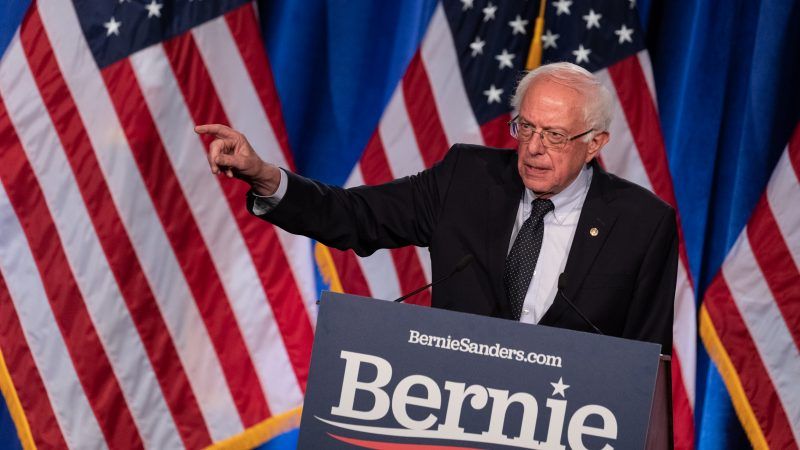Bernie Sanders Gets a Lesson in What a $15 Minimum Wage Would Mean
But the campaign workers complaining about their union-negotiated salaries are being hypocritical too.

Sen. Bernie Sanders (I–Vt.) is, first and foremost, a politician. As a politician, he is responsible for setting rules that govern how other Americans must live and work.
He's got lots of ideas about that. One of his ideas—one of the more popular ones, considering that a version of it passed the House of Representatives this week—is that workers should be paid no less than $15 an hour, regardless of what agreement they and their employers might have otherwise reached.
But Sanders is also an employer.
As a presidential candidate, Sanders in charge of a national campaign operation that employs dozens of people (along with many more unpaid volunteers). But despite what Sanders believes other employers should have to do to treat their employees fairly, his campaign does not offer a $15 per hour minimum wage.
Some of his employees aren't very happy about that cognitive—and fiscal—dissonance. They intend to send a sternly worded letter to campaign manager Faiz Shakir in the coming days, The Washington Post reports. "Many field staffers are barely managing to survive financially, which is severely impacting our team's productivity and morale," says a leaked copy of the letter. It goes on to say that field workers "cannot be expected to build the largest grassroots organizing program in American history while making poverty wages."
Some background: Sanders' operation announced in March that it would be the first presidential campaign in American history to have all low-level employees represented by a union. The contract that the union signed with the campaign promises $36,000 in salary (and full health care benefits) for the lowest-level field workers. The workers now say they are earning less than $15 an hour when you calculate how much they make while toiling for 60 hours or more each week to help get Sanders elected. But they agreed to be paid a set salary rather than an hourly rate, so the criticism should be taken with more than a few grains of salt. Maybe joining the union didn't quite go the way they planned.
Still, it's telling to see how Sanders' campaign responded to the allegation that the Vermont socialist is not putting his money where his mouth is.
In a statement, Shakir stressed that Sanders' campaign "offers wages and benefits competitive with other campaigns, as is shown by the latest fundraising reports."
Exactly! If Sanders' campaign can find a sufficient number of employees willing to work for $10 an hour or $12 an hour, that's fine. No one is being coerced to work for him, and he's paying what the market for field workers allows.
Sanders the politician likes to criticize other employers for doing exactly what he's doing.
"Americans should not be subsidizing the richest family in America and Walmart workers should not be living in poverty," Sanders tweeted last month, castigating the big box retailer for not paying all workers $15 per hour. "Walmart's greed has got to end," he added.
But Sanders the employer surely knows that paying field workers $12 an hour instead of $15 per hour will allow his campaign to hire more field workers. He's not employing those people because it makes him feel good to do it, and he's not paying less than $15 per hour because he's a skinflint multi-millionaire who is too greedy to care about workers. He's employing them to help him succeed in a highly competitive arena where small margins can make a big difference.
When the problems with a government mandated minimum wage are so obvious that even a socialist's campaign can't help but acknowledge them, it should probably make you wonder if Sanders the politician is being willfully ignorant about one of his centerpiece proposals.


Show Comments (79)